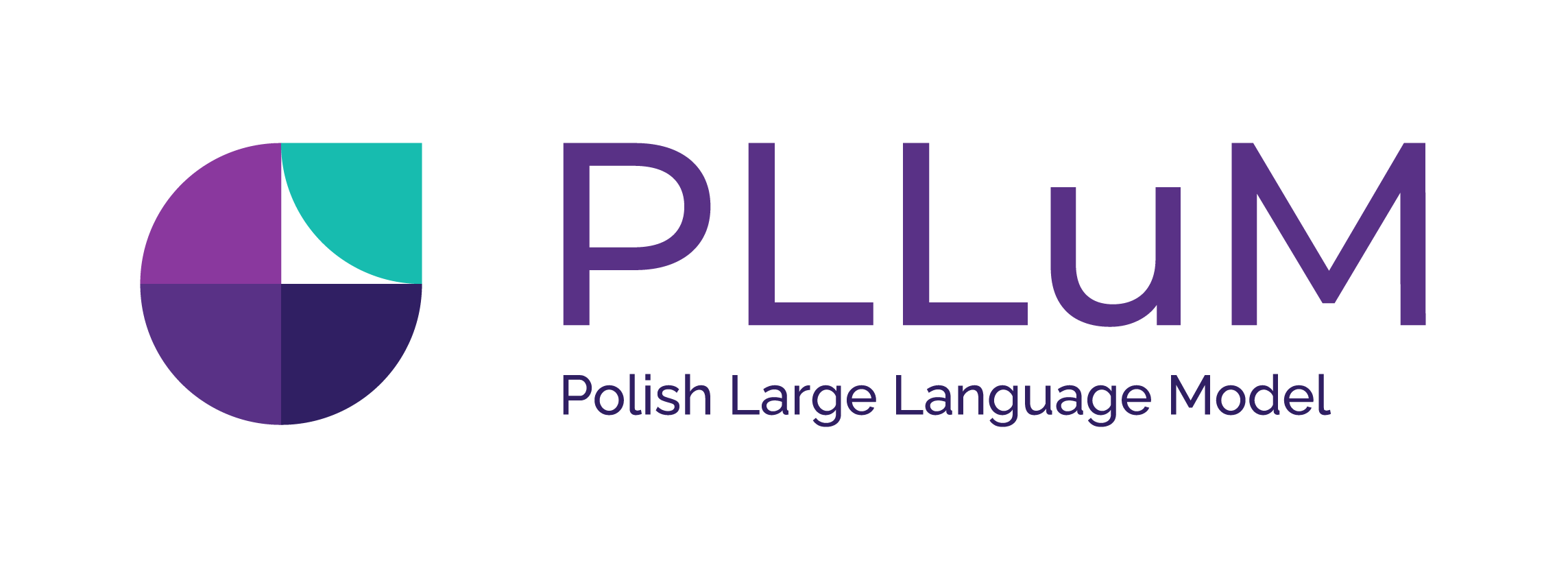https://github.com/piotrmaciejbednarski/pllum-cookbook
This repository contains example Jupyter notebooks demonstrating how to use the quantized versions of the PLLuM-8x7B-chat model in GGUF format
https://github.com/piotrmaciejbednarski/pllum-cookbook
gguf huggingface jupyter-notebook llm pllum quantization
Last synced: 5 months ago
JSON representation
This repository contains example Jupyter notebooks demonstrating how to use the quantized versions of the PLLuM-8x7B-chat model in GGUF format
- Host: GitHub
- URL: https://github.com/piotrmaciejbednarski/pllum-cookbook
- Owner: piotrmaciejbednarski
- License: apache-2.0
- Created: 2025-03-01T06:55:17.000Z (9 months ago)
- Default Branch: main
- Last Pushed: 2025-03-01T06:57:28.000Z (9 months ago)
- Last Synced: 2025-06-14T12:38:08.580Z (6 months ago)
- Topics: gguf, huggingface, jupyter-notebook, llm, pllum, quantization
- Language: Jupyter Notebook
- Homepage: https://huggingface.co/piotrmaciejbednarski/PLLuM-8x7B-chat-GGUF
- Size: 25.4 KB
- Stars: 1
- Watchers: 1
- Forks: 0
- Open Issues: 0
-
Metadata Files:
- Readme: README.md
- License: LICENSE
Awesome Lists containing this project
README
# PLLuM-8x7B-chat-GGUF Examples
This repository contains example Jupyter notebooks demonstrating how to use the quantized versions of the [PLLuM-8x7B-chat](https://huggingface.co/CYFRAGOVPL/PLLuM-8x7B-chat) model in GGUF format.

## Overview
PLLuM (Polish Large Language Model) is an advanced family of Polish language models developed by the Polish Ministry of Digital Affairs. The quantized versions in GGUF format allow for efficient running on consumer hardware with reduced memory requirements while maintaining good quality of generated text.
This repository provides practical examples of how to use these models with different libraries and approaches.
## Requirements
To run the examples, you'll need:
```bash
pip install -r requirements.txt
```
The requirements.txt file includes:
- jupyter
- llama-cpp-python
- transformers
- accelerate
- sentencepiece
- matplotlib
- pandas
- gradio (optional, for web UI examples)
## Available Examples
The repository contains the following example notebooks:
1. [`basic_inference.ipynb`](notebooks/basic_inference.ipynb) - Basic text generation using llama-cpp-python
2. [`chat_completion.ipynb`](notebooks/chat_completion.ipynb) - Chat completion interface with conversation history
3. [`model_comparison.ipynb`](notebooks/model_comparison.ipynb) - Comparison between different quantization levels
4. [`gradio_web_ui.ipynb`](notebooks/gradio_web_ui.ipynb) - Simple web interface using Gradio
## Model Variants
The examples work with all available quantized versions:
| Quantization | Size | Recommended for |
|--------------|------|-----------------|
| Q2_K | 17 GB | Minimal resources, lower quality |
| IQ3_S | 20.4 GB | Low resources with acceptable quality |
| Q3_K_M | 22.5 GB | Good balance for CPU usage |
| Q4_K_M | 28.4 GB | Recommended for most applications |
| Q5_K_M | 33.2 GB | High quality with reasonable size |
| Q8_0 | 49.6 GB | Highest quantized quality |
| F16/BF16 | ~85 GB | Reference without quantization |
## How to Download Models
You can download the models from [Hugging Face](https://huggingface.co/piotrmaciejbednarski/PLLuM-8x7B-chat-GGUF) using:
```bash
# Install huggingface-cli
pip install -U "huggingface_hub[cli]"
# Download a specific model (e.g., q4_k_m)
huggingface-cli download piotrmaciejbednarski/PLLuM-8x7B-chat-GGUF --include "PLLuM-8x7B-chat-gguf-q4_k_m.gguf" --local-dir ./models/
# For faster downloads
pip install hf_transfer
HF_HUB_ENABLE_HF_TRANSFER=1 huggingface-cli download piotrmaciejbednarski/PLLuM-8x7B-chat-GGUF --include "PLLuM-8x7B-chat-gguf-q4_k_m.gguf" --local-dir ./models/
```
## Getting Started
1. Clone this repository:
```bash
git clone https://github.com/piotrmaciejbednarski/pllum-examples.git
cd pllum-examples
```
2. Install dependencies:
```bash
pip install -r requirements.txt
```
3. Download a model using the instructions above
4. Start Jupyter:
```bash
jupyter notebook
```
5. Open one of the example notebooks in the `notebooks/` directory
## License
This repository is provided under the [Apache License 2.0](LICENSE), the same license as the original PLLuM model.
## Credits
- Original PLLuM model developed by [CYFRAGOVPL](https://huggingface.co/CYFRAGOVPL)
- GGUF quantization by [Piotr Bednarski](https://github.com/piotrmaciejbednarski)
- Examples in this repository by [Piotr Bednarski](https://github.com/piotrmaciejbednarski)